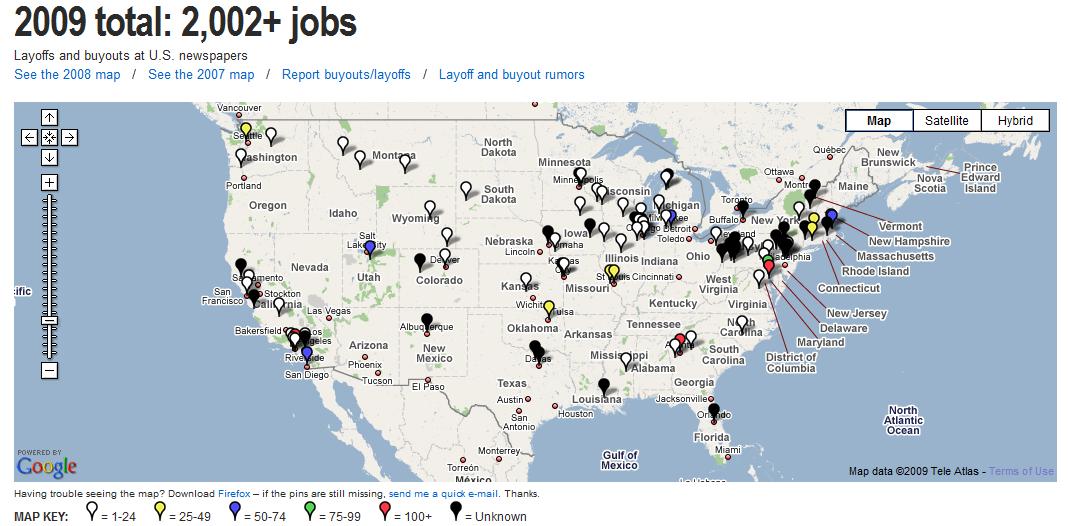Many of my friends are journalists — reporters, editors, photographers, the many things people do to deliver you the news every day.
But with advertising drying up and Wall Street hammering on news organizations that mostly still seem flummoxed by how to make money online, that’s a tough place to make a living.
A graphic designer started keeping track of all the job loses she heard of on a heart-breaking site called Paper Cuts. (I don’t quite understand how to make the map work every time, but the listings are there nonetheless) In 2009, it’s already more than 2,000 jobs. It’s still January. In 2008, it was more than 15,500.

What does that mean? For someone who believes deeply in the role newspapers serve in an educated, informed democracy, it means fewer people playing the watchdog role and consistently monitoring government, business and other institutions, and also fewer people chronicling our lives and knitting the community together. Yes, I know about social media and bloggers but without real full-time journalists reporting the news, how many of them would lose the material they comment on?
That’s the macro level. At the micro level, it means many of the people who’ve lost their media jobs are probably not going to find another. Lots of talented, experienced people are chasing a shrinking number of opportunities.
The American Journalism Review has a new article called “Is There Life After Newspapers?”
Just under the headline is this subhead: Thousands upon thousands of newspaper journalists have lost their jobs in recent years in endless rounds of layoffs and buyouts. What happens in the next act?
I met a Michigan grad this week who recently got laid off from her newspaper job. She’s moved home to live with her parents while she looks for work. We had a familiar conversation about how you don’t choose a career known for its lousy pay and rotten hours if you don’t feel a calling, and the prospect of leaving it can be deeply depressing. I cried big boo-hoos when I left a profession that’s not something you do but something you are.
But AJR offers hope. In an unscientific survey of journalists who’ve lost their jobs, they found this.
While the overwhelming majority – 85 percent – say they miss working at a paper, they are often happier in their new jobs. Sixty-two percent tell us they had been satisfied in their old newspaper jobs; 78 percent report being satisfied in their new jobs.
So there’s the moral of the story. You can still be nostalgic for the life you left behind, but that doesn’t mean you can’t also enjoy whatever comes next.
Trying to figure out what to do after your last career dried up? Forbes offers some ideas of $100k jobs that don’t require a college degree. I’m not sure real estate agent is the best choice right now, but maybe it’ll spark some ideas anyway.
Here’s a question for my pals who’ve left newspapers: In retrospect, how do you feel about that decision?

